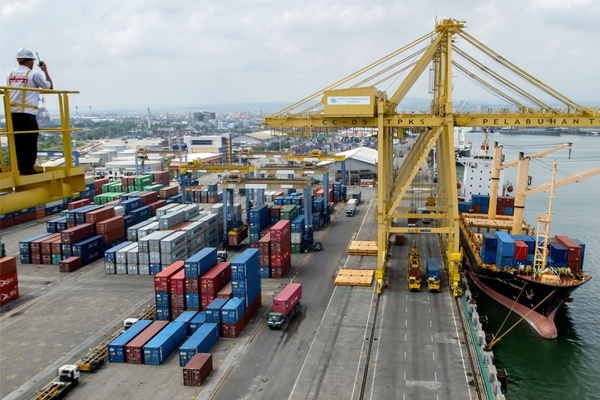Indonesia imports, exports hit all-time high in March
이 글자크기로 변경됩니다.
(예시) 가장 빠른 뉴스가 있고 다양한 정보, 쌍방향 소통이 숨쉬는 다음뉴스를 만나보세요. 다음뉴스는 국내외 주요이슈와 실시간 속보, 문화생활 및 다양한 분야의 뉴스를 입체적으로 전달하고 있습니다.

“Just like exports, our imports are also at an all-time high in March,” said BPS head Margo Yuwono during a press conference. Read also: Ukraine war may bring windfall to Indonesia's trade balance As a result, Indonesia's trade surplus reached a six-month high of $4.53 billion in March, up nearly three fold from the same month last year and marking 23 consecutive months of surplus. On a month-to-month (mtm) basis, imports and exports increased 32.02 percent and 29.42 percent, respectively.
Indonesian trade has been breaking records since last year largely because of a commodity price boom, with exports last reaching a record high of $22.84 billion in November 2021 and imports $21.35 billion in December 2021. Read also: Exports hit record high for third month in row in November The global surge in commodity prices is expected to have a net positive impact on Indonesia's trade, as rising prices of exported commodities like coal and CPO outweigh rising prices of imported goods, particularly crude oil. “It all depends on whether the war between Russia and Ukraine would be a prolonged one or a quick one, as it could move the price of international commodities,” Margo said. BPS data shows that rising non-oil and gas exports were led by coal, followed by steel, CPO, nickel and precious metals. The rise in price of these commodities were exacerbated by the war between Russia and Ukraine, both of which are major commodity producers. BPS noted that prices of these commodities were at least at one-year highs with coal at $294.4 per ton, nickel at $33,924 per ton and CPO at $1,777 per ton, as of March.
Non-oil and gas imports were led by electronics, machinery, steel, plastic products and auto parts. Oil prices have risen 78.74 percent yoy to $113.5 per ton as of March, according to BPS. Center of Economic and Law Studies (CELIOS) director Bhima Yudhistira said the recent easing of mobility curbs in South Korea helped boost Indonesia exports, which rose 76 percent yoy in the first quarter of 2022. He added that the latest figures showed that Indonesia's exports were unaffected by the recent COVID-19 lockdowns in China. China remains Indonesia's main export destination with $5.48 billion worth of non-oil and gas exports. India and the United States trail behind with $2.83 billion and $2.06 billion, respectively. Indonesia logged a trade surplus with India at $2 billion and with the US at $1.2 billion as of March, BPS data shows. "The trend of rebounding exports will continue in the second quarter of 2022," he said. Read also: G20 finance chiefs to meet in US amid Ukraine crisis However, Bhima outlined three risks for Indonesian export volumes going forward, namely rising raw material prices, interest rate hikes and supply chain snags. High raw material prices could make Indonesian manufactured goods uncompetitive, higher interest rates could make it harder for exporters to expand operations and lingering supply chain snags in several countries could disrupt the flow of goods, he said. Bank Indonesia (BI) held its benchmark interest rate at a record low 3.5 percent in March as domestic inflation remained low. But economists say that the central bank might raise rates soon in response to rising domestic prices and monetary tightening in the US.
https://www.thejakartapost.com/business/2022/04/18/indonesia-imports-exports-hit-all-time-high-in-march.html
[ⓒ Maeil Business Newspaper & mk.co.kr, All rights reserved]
Copyright © 매일경제 & mk.co.kr. 무단 전재, 재배포 및 AI학습 이용 금지
- Korea to abolish quota system for foreign welders, painters at shipyards - Pulse by Maeil Business News Korea
- Debt rising faster than income amid inflation threatens Korean demand - Pulse by Maeil Business News Korea
- Legislative endorses BOK chief nominee Rhee Chang-yong - Pulse by Maeil Business News Korea
- Korea’s F&F partially cashing out of TaylorMade less than 1 year after invest - Pulse by Maeil Business News Korea
- Production constraint driven by chip shortages may continue into 2025 - Pulse by Maeil Business News Korea
- 강경준, 상간남 피소…사랑꾼 이미지 타격 [MK픽] - 스타투데이
- “연말정산 놓치셨다고요?”…5월 종합소득세 신고 ‘꿀팁’
- 대만 치어리더 한국스포츠 첫 진출…K리그 수원FC - MK스포츠
- 이찬원, 이태원 참사에 "노래 못해요" 했다가 봉변 당했다 - 스타투데이
- 양희은·양희경 자매, 오늘(4일) 모친상 - 스타투데이